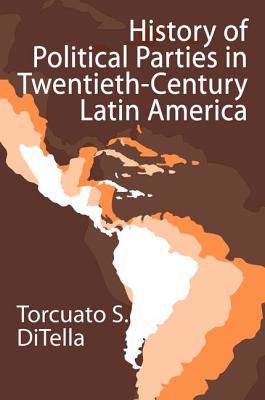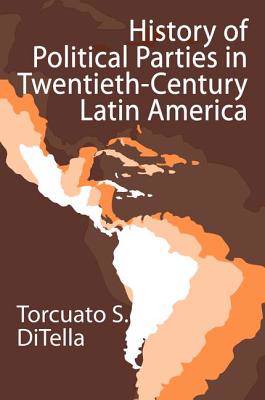
- Afhalen na 1 uur in een winkel met voorraad
- Gratis thuislevering in België vanaf € 30
- Ruim aanbod met 7 miljoen producten
- Afhalen na 1 uur in een winkel met voorraad
- Gratis thuislevering in België vanaf € 30
- Ruim aanbod met 7 miljoen producten
Zoeken
History of Political Parties in Twentieth-Century Latin America
Torcuato Di Tella
Hardcover | Engels
€ 195,95
+ 391 punten
Omschrijving
The general perception of modern Latin American political institutions emphasizes a continuing and random process of disorder and crisis, continually out of step with other regions in their progress toward democracy and prosperity. In History of Political Parties in Twentieth-Century Latin America, Torcuato S. Di Tella demonstrates that this common view lacks context and comparative nuance, and is deeply misleading. Looking behind the scenes of modern Latin American history, he discerns its broad patterns through close analysis of actual events and comparative sociological perspectives that explain the apparent chaos of the past and point toward the more democratic polity now developing.Di Tella argues that although Latin America has peculiarities of its own, they must be understood in their contrasts--and similarities--with both the developed centers and undeveloped peripheries of the world. Latin American societies have been prone to mass rebellions from very early on, more so than in other regions of the world. He analyzes, as well, such significant exceptions to this pattern as Chile, Colombia, and, to a large extent, Brazil. Turning to the other side of the social spectrum, he shows how the underpriviledged classes have tended to support strongman populist movements, which have the double character of being aggressive toward the established order, but at the same time repressive of public liberties and of more radical groups. Di Tella provides here a necessary examination of the concept of populism and divides it into several variants. Populism, he maintains, is by no means disappearing, but its variants are instead undergoing important changes with significant bearing on the region's near-term future.History of Political Parties in Twentieth-Century Latin America is rich in historical description, but also in its broad review of social structures and of the strengths and weaknesses of political institutions. Choice commented that "this heavily documented volume with an extensive bibliography would prove valuable to researchers and advanced students of Latin America."
Specificaties
Betrokkenen
- Auteur(s):
- Uitgeverij:
Inhoud
- Aantal bladzijden:
- 176
- Taal:
- Engels
Eigenschappen
- Productcode (EAN):
- 9781138525153
- Verschijningsdatum:
- 6/10/2017
- Uitvoering:
- Hardcover
- Formaat:
- Genaaid
- Afmetingen:
- 152 mm x 229 mm
- Gewicht:
- 452 g

Alleen bij Standaard Boekhandel
+ 391 punten op je klantenkaart van Standaard Boekhandel
Beoordelingen
We publiceren alleen reviews die voldoen aan de voorwaarden voor reviews. Bekijk onze voorwaarden voor reviews.











